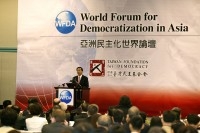News & activities
 News releases
News releases

Chairman Wang of Taiwan Foundation for Democracy and Speaker of the Legislative Yuan, Former President Mejia of the Dominican Republic, Former President Flores of El Salvador, Former Prime Minister and Congressman Amarjagal of Mongolia, Senior Presidential Advisors, Vice-Chairman of Taiwan Foundation for Democracy and Foreign Minister Chen, Foreign dignitaries, Experts and scholars, Friends from the media, Ladies and Gentlemen: Good Morning!
First, on behalf of the government of the Republic of China and the 23 million people of Taiwan, I would like to extend my warmest welcome to all our distinguished guests who have come from afar to participate in the first-ever biennial "World Forum for Democratization in Asia," held in Taiwan this year. Your presence here and your participation in the discussions of the prospects of democratization in Asia bear witness to democracy as a universal value that transcends national boundaries. The partaking in this forum by all of you also elucidates the importance of democratization to Asia's peace and prosperity, and brings into the light the appeal and fascination of Taiwan as a free society in this region.
Democracy and human rights are universal values upheld by the world; and experiences in democratization are intangible assets that a country is eager to share with other nations. Over the past half a century, the 23 million people of Taiwan toiled tirelessly on this land, dedicating themselves to the creation of economic miracles and democratic achievements. Today, the "Story of Taiwan" is a much talked about success story that has won the respect and admiration of the world.
Taiwan is a burgeoning democratic country in Asia; it is also the first Asian country to launch a national foundation to promote democracy. We are proud of these accomplishments, for that "democracy" is the very foundation based on which Taiwan has become a hallmark of democratization in Asia and beyond; and that Taiwan's democratic experiences are now invaluable assets forever shared by the international community. More importantly, "democracy" is the anchor for Taiwan society's long-term security and stability.
The key for Asia to become fully democratized hinges on the question of whether Asia's economy will continue to develop and whether security and stability in this region can be maintained. Sixty years after the conclusion of World War II, countries in Asia have progressively achieved economic prosperity. In many countries, including Taiwan, where democracy and the rule of law have been gradually established, the people have also begun to enjoy freedom and human rights. Asia today is a place where hope abounds and exciting growth and developments have also flourished; without a doubt, this region now holds unparalleled potential for the attainment of a grand future.
On the other hand, a few non-democratic political entities in Asia constitute significant yet not fully disclosed threats to Asia's regional stability. Nuclear problems in North Korea have turned into a nightmare for countries in Northeast Asia. Burma's military junta has instigated both internal and external controversy and bewilderment among ASEAN countries. Moreover, the People's Republic of China (PRC) continues to cast the shadow of war over the Taiwan Strait as it increases its military budget at an annual double-digit rate. The PRC has also deployed between 650 to 730 ballistic missiles targeted at Taiwan, clearly tipping the balance of cross-Strait military power in favor of China. In mid-March of this year, China unilaterally passed the so-called "Anti-Separation Law," stipulating the use of "non-peaceful" means to resolve issues in the Taiwan Strait. China's actions not only gravely imperil the democracy so cherished by the 23 million people of Taiwan but also pose serious challenges to regional security and order in Asia.
To meet the abovementioned challenges and to safeguard Asia's peace and prosperity, we must provide an impetus for further democratizations among countries in Asia and establish an Asian democratic community within this region. Democratic countries in Asia must join forces with other democratic countries in the world to form a global community of democracies, and together strive to liberalize isolated societies in Asia, to guide Asian countries undergoing transformation through successful democratization, and to provide assistance to already democratized countries to continue to strengthen their democratic institutions and foster civic cultures within.
"World Forum for Democratization in Asia" was founded with a mission to promote democracy and to provide a platform for open dialogue among Asian NGOs for democracy and freedom. Moreover, this forum aims to establish goals for regional cooperation and to hasten the creation of fully democratized societies in Asia. I would like to take this opportunity to extend my sincere appreciation to our friends and colleagues in the Taiwan Foundation for Democracy and to members of the Organization Committee, including: The Alliance for Reform and Democracy in Asia, Alternative ASEAN Network on Burma, Forum Asia Democracy, and Initiatives for International Dialogue. I am convinced that yours efforts will bring about greater awareness and enthusiasm for democratic participation among peoples in Asia.
In closing, I would like to once again express my sincere welcome to all distinguished participants. I wish the forum great success and health and happiness to all of you. Thank you.


